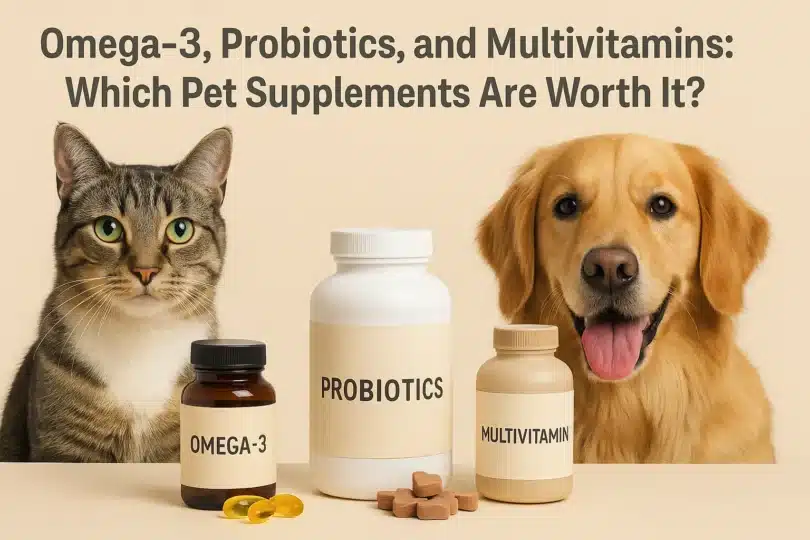Walk into any pet store or browse online in 2025, and you’ll find shelves filled with supplements for dogs and cats. From fish oil capsules to probiotic chews and daily pets multivitamins, the options can feel overwhelming. Pet owners want to give their animals the very best, but the question is: which supplements are truly worth the investment? This article breaks down the three most popular categories—Omega-3 fatty acids, probiotics, and multivitamins—to help pet parents make smart, science-based choices for their companions.
Why Supplements Matter for Pets
Even high-quality pet foods don’t always meet every nutritional need. Factors like age, breed, health conditions, and lifestyle can create gaps that supplements help fill. Omega-3s may improve skin, coat, and joint health. Probiotics support digestion and immunity. Pets multivitamins provide a safety net for overall wellness. Together, these categories represent the foundation of pet supplementation today.
Omega-3 Fatty Acids: Anti-Inflammatory Power
Omega-3s—especially EPA and DHA from fish oil—are among the most widely researched pet supplements. They reduce inflammation throughout the body, making them helpful for arthritis, allergies, and heart health. Many owners also notice shinier coats and less itching in their pets after regular use. Plant-based Omega-3s (ALA from flaxseed or chia) are less effective but can provide some benefit for vegetarian households.
- Best for: Skin & coat health, joint pain, heart health, cognitive function in older pets.
- Common forms: Fish oil softgels, liquid oils, or chews flavored for pets.
- Evidence: Strong; multiple veterinary studies support use in both dogs and cats.
Probiotics: Gut Health and Immunity
Probiotics are live microorganisms that support the gut microbiome. For pets, probiotics can reduce diarrhea, improve digestion, and strengthen immunity. They’re especially useful after antibiotics or during times of stress. Certain strains are tailored for pets, such as *Enterococcus faecium* and *Bifidobacterium animalis*.
- Best for: Digestive issues, loose stools, immune support, pets with sensitive stomachs.
- Common forms: Powders added to food, chews, capsules.
- Evidence: Moderate to strong; effectiveness depends on strain and dosage.
Pets Multivitamins: Insurance for Wellness
Daily multivitamins are designed to cover potential gaps in commercial or homemade diets. They typically include vitamins A, D, E, and B-complex, as well as minerals like zinc and selenium. While not always essential for young, healthy pets on balanced diets, multivitamins can be valuable for older animals, picky eaters, or those with special health needs.
- Best for: Overall wellness, aging pets, homemade diets lacking balance.
- Common forms: Flavored chews, tablets, powders for mixing with food.
- Evidence: Moderate; helpful in specific cases but less impactful than targeted supplements like Omega-3s.
How to Prioritize Spending
For pet owners on a budget, starting with Omega-3s and probiotics often delivers the most visible results. Omega-3s reduce itching and stiffness, while probiotics improve digestion and stool quality. Pets multivitamins are more of a long-term investment in overall health rather than a quick fix. Choosing high-quality, species-specific formulas is more important than buying multiple low-grade products.
Market Trends in 2025
Combination products are becoming increasingly popular, such as chews that combine Omega-3s with probiotics or pets multivitamins with joint support. Subscription-based pet wellness boxes are also on the rise, offering tailored supplement bundles. The global pet supplement market is expected to hit $4 billion by 2028, with Omega-3s and probiotics leading sales. For affiliates, these categories are reliable earners thanks to strong consumer demand and repeat purchases.
Risks and Considerations
Not all supplements are safe or effective. Low-quality fish oils may oxidize quickly, reducing potency. Some probiotics may contain strains not studied in pets, making them ineffective or even harmful. Multivitamins must be carefully dosed—too much vitamin D or calcium can cause toxicity. Always choose vet-approved or third-party tested products.
Closing
Not every supplement is worth buying, but Omega-3s, probiotics, and multivitamins stand out as the foundation of pet supplementation. Omega-3s shine for inflammation, skin, and joints; probiotics improve gut balance and immunity; multivitamins offer broad wellness support. With high-quality products and consistent use, these three categories can meaningfully improve the health and happiness of dogs and cats in 2025.

